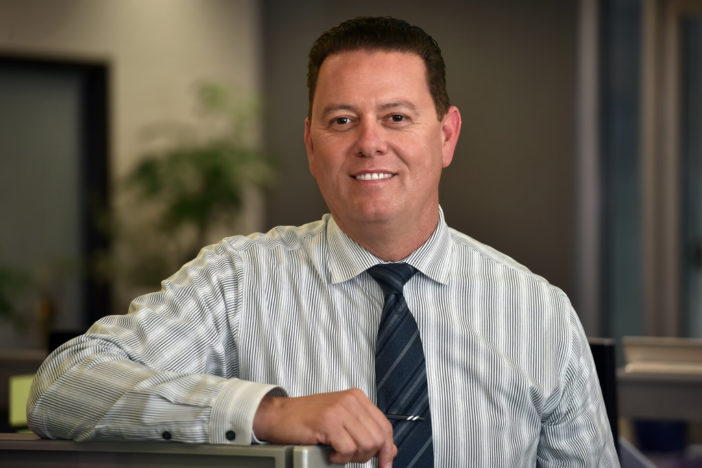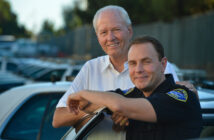Her face was destroyed.
“She looked like a prize fighter,” Orange County Sheriff’s Department Investigator Manny Cruz recalls of the severely battered woman.
And yet, as is the sad case with many victims of domestic violence, the woman initially lied to Cruz and a colleague in the OCSD’s Family Protection unit about who beat her up in the bathroom of her south O.C. home while her children watched TV.
Eventually, the woman told investigators, it was her husband of four years who pummeled her. The man, who had a history of DV (shorthand for domestic violence), eventually was sentenced to 10 years in prison for the crime.
As Domestic Violence Awareness Month winds down this October, Cruz implores anyone caught in the vicious cycle of DV to report any and all incidents, and to avail themselves of the many available services that are geared at getting them out of their hellish situation.
But Cruz, an OCSD veteran of 17 years who for the past two-and-a-half years has investigated DV, child abuse and elder abuse cases, is keenly aware of how difficult it is for many victims of DV to escape the cycle.
“For domestic violence victims,” says Cruz, “there are usually years of them being torn down. (The abusers) tear down their character to the point where they’re broken and they feel there’s nowhere to go.”
But there most definitely is, as organizers of Domestic Violence Awareness Month, as well as Cruz, stress.
At a time when the #metoo movement has become a household word, Cruz and others are hopeful that the issue of DV soon will gain similar traction nationwide, where every minute an average of 20 people experience physical violence from an intimate partner, according to the National Coalition Against Domestic Violence.
That equates to more than 10 million DV victims annually.
In Orange County, Cruz and his colleagues on the Family Protection Detail, formed in 1999, have their hands full, responding to an average of four to five cases a day (which includes includes child and elder abuse cases).
The day before he sat down for a recent interview, Cruz himself received a new DV case and two child abuse cases.
It’s often ugly and dispiriting work, but Cruz says it’s rewarding.
“I find an internal joy in helping these kinds of victims,” he says. “They are silenced a lot and not taken as seriously as other (crime victims). I find joy in helping them.”
In addition to Cruz, the OCSD’s Family Protection team includes Lt. Andy Stevens, Sgt. Cruz Alday, Investigator Rebecca Reger, Investigator Amy Burmood, Investigator Chris Hunt, Investigator Kristen Hayman, Investigator Kat Degen, and victim advocates Esmeralda Fernandez and Laura Criss.
Cruz and his colleagues are responsible for any follow-up investigations after patrol deputies respond to incidents.
“We investigate all domestic violence if (the suspects) are not in custody,” Cruz explains. “For example, let’s say that a patrol deputy goes to a domestic violence call and he or she is able to arrest the bad guy. We normally won’t respond unless there’s follow-up to do. That case would go to the District Attorney’s Office.”
In most cases, however, the bad guy is gone when the OCSD gets DV calls. Cruz and his colleagues then go to work.
“We’ll interview the victim, receive any medical release forms, possibly get phone numbers to write telephone search warrants as well as search warrants in general to try to find where the suspect is, get warrants for photographs or whatever, and then go look for the (suspect),” Cruz says.
When suspects are in the wind, victims remain terrified.
“A lot of them don’t feel like (the crime is) over, and they remain scared,” Cruz says.
FORMER BUSINESS OWNER
Cruz, who is married with two daughters, owned a commercial fencing company for eight years before law enforcement caught his eye.
“Being a business owner has its positives and negatives, and one negative was the happiness that I had as a business owner was depleting,” he says.
Cruz went on a website and law enforcement appealed to him, he says. He could relate to the Type A personalities drawn to the career who also are driven to make a difference.
“I think to be in law enforcement,” Cruz says, “you have to have an intrinsic motivation to want to help people. It’s just what we do. I don’t know where it comes from, maybe upbringing.”
Before becoming an investigator on the Family Protection Unit, Cruz was a motor deputy and a member of MART (Major Accident Reduction Team), in addition to stints working jails and patrol.
Critical to his current position, he says, is the ability to balance a heavy caseload.
“It involves more than victims, but victims’ families and the victim advocates we interact with on a daily basis.”
Cruz and his colleagues work 5 a.m. to 3:30 p.m. shifts four days a week, but are available 24/7 to respond to calls.
OCSD patrol deputies will respond to all verbal arguments reported by citizens.
“The sheriff requires us to respond to anything a member of the public wants us to respond to,” Cruz explains. “When we get to a scene, we’ll determine, based on a pre-investigation conducted by the patrol deputy as well as further investigation, whether a crime has been committed.”
Mere spitting can rise to the level of DV, he says.
“Anything that is an unlawful attempt, coupled with the ability to commit a violent action, can be considered an assault,” Cruz says.
Whether the OCDA will file a criminal complaint, however, is a different matter, especially when it comes to “he said, she said” DV cases.
It’s common for DV victims, Cruz adds, to call the OCSD to report an incident but change their minds when deputies arrive. They often are afraid, he says, of being on their own, with little money and no place to stay.
HELP IS AVAILABLE
But help is available.
“We’ll offer them advocacy and give them the opportunity to connect with a nonprofit organization or a shelter, and some of them will take advantage, and others just don’t see the (benefit),” Cruz says.
“Some may go to a shelter, but then ask themselves, ‘Now what?’ They’ll think, ‘Where am I going to go? What am I going to do? I don’t have any money. I don’t have a car. I’ve got a kid to feed. (The suspect) knows where I live.’ It’s just this horrible, horrible thing.”
But success stories abound for DV victims willing to make a big change, Cruz says,
“For many victims,” he says, “all they need is that one step.”
A victim’s advocate will walk a person through the ways she or he can move forward in their life.
“And it’s like a breath of fresh air for them,” Cruz says. “All of a sudden they’re like, ‘That’s all I needed. All I needed was somebody to tell me how to get a restraining order, where I can go to get some kind of funds that will allow me to eventually get to the next step in my life. And we hear those success stories often.”
Such successes help keep Cruz and his colleagues motivated.
“You remember that these people have a voice,” he says, “and you make sure that you don’t become jaded.”
Cruz has two main pieces of advice for DV victims.
“The No. 1 advice that the sheriff’s department could give to victims is to never stop reporting the abuse,” he says. “The first time you report it gets documented, and once an incident gets documented, there’s teeth, there’s history… And then it’s not just a ‘he said, she said’ case anymore.
“No 2, I would tell victims that there’s always help. They have a preconception in their mind that no one’s going to understand them, that their situation is so dire that they’re not going to able to get out of it. It might be a slow and difficult process, but the alternative is worse.”
 Behind the Badge
Behind the Badge



